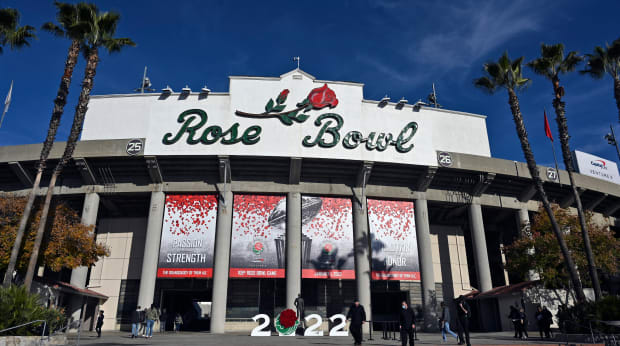Laura Farber, a lawyer by trade, found herself in a courtroom Wednesday defending a deposition when she glanced over at her opposing counsel and delivered to them a message.
“I apologized to him and told him I’d need to take a lot of breaks today,” Farber says.
On one of the more significant deadline days in college football history, Farber successfully completed her juggling act. As the chair of the Rose Bowl Management Committee, she argued a court case and completed the Rose Bowl’s long-awaited decision on College Football Playoff expansion. The oldest active bowl game agreed to amend its contract with the CFP, paving the way for the playoffs to expand from four to 12 teams in 2024.
“We had no intention of being and did not believe we would ever be the sole reason why this didn't happen,” Farber says on Thursday. “So what I can say is that we appreciate the CFP Board of Managers. The agreement includes the Rose Bowl game as part of the playoff system and we're looking forward to working with them. Because as you know, this is going to be just the beginning!”
The Rose Bowl and CFP officials were immersed in negotiations over the last few weeks, right up until Wednesday, a date that CFP executives set for the bowl to ultimately make a decision. The Rose was in position to single-handedly delay playoff expansion. CFP officials needed unanimous agreement from the six CFP bowls to expand the playoff to 12 teams before the contract with ESPN ends after the 2025 playoff. Five of the six—Sugar, Orange, Fiesta, Peach and Cotton—were in support of amending the contract to expand early.
The Rose delayed its decision while requesting guarantees to keep its traditional date and time (2 p.m. PT on Jan. 1) in future iterations of the playoff, something the CFP executive board denied. Few if any guarantees can be made for the playoff beyond 2025 because no contract exists.
In the end, the Rose Bowl received no special treatment. There were no guarantees or concessions made for a future playoff, CFP executive director Bill Hancock said. However, on multiple occasions during a 30-minutes news conference, Hancock suggested that the CFP will make attempts for the Rose to maintain its date and time when applicable.

John McCoy/AP
“It’d be in everyone's best interest for anything CFP that happens in the Rose Bowl to kick off at 2 pm PT,” he said.
Farber acknowledged that the Rose Bowl asked the CFP to keep its exclusive window in any playoff that begins after 2025 but ultimately relinquished that request. The game is prepared to “remain flexible” with the schedule as needed, though their intent is to remain on Jan. 1.
In a newly constructed playoff, that may be difficult. In the expanded playoff format approved by presidents on Sept. 2, the six legacy bowls would host the quarterfinals and semifinals in a rotation. In a three-year window, each bowl would host two quarterfinals and a semifinal.
As a quarterfinal in 2024 and ’25, the Rose Bowl is expected to keep its traditional date and time. At least three of the four quarterfinals will kickoff on New Year’s Day in both ’24 and ’25.
However, in the new iteration of the playoff starting in 2026, the rounds may change dates. The semifinals could instead be played on New Year’s Day if the regular season shifts up a week, something many believe will ultimately happen.
In that case, the Rose would kick off on Jan. 1 once every three years. On years in which its CFP game is not played on New Year’s Day, the Rose could hold a second game pitting a Pac-12 and Big Ten team during its traditional time window.
Officials are open to that idea but have not made a decision.
“It’s premature because we don't know until we know what the system looks like,” Farber says. “What the schedule is, how it’s going to work … we don’t have the ability to even think about what you’ve just asked me. I’m not going to say that it’s in the mix or not in the mix. I’m just gonna say it’s premature at this point.”
The negotiations between the Rose and the CFP dragged on longer than others because of the financial component, says Farber. Unlike the other bowls, the Rose has a separate agreement with ESPN, as well as a deal with the Pac-12 and Big Ten.
It’s uncertain if those separate contractual deals will continue in a new playoff, Farber said. The CFP prefers all contracts to be under the CFP umbrella, Hancock has said in the past.
“We’ve been negotiating the entire time,” Farber said. “In all negotiations, there’s always back and forth. And as the only bowl game with a separate broadcast contract, it wasn't the smoothest process.”
She reiterated that the bowl never planned to stand in the way of early expansion. Though some CFP officials expressed frustration over the Rose Bowl’s requests, the game was “never threatened” with exclusion from the new playoff, Farber said.
“From the Alliance to the BCS to get the four-team playoff and now to the upcoming 12 team playoff, we have found ways to integrate the ‘Granddaddy of Them All’ into them all,” Farber said. “We’re confident that an expanded playoff is going to create opportunities and an exciting postseason atmosphere and and we’re very supportive of the College Football Playoff and thrilled to be part of it.”







